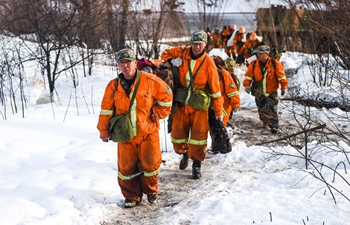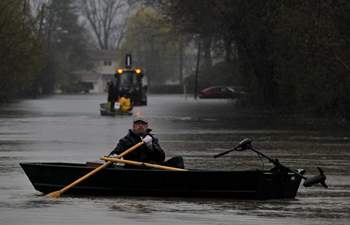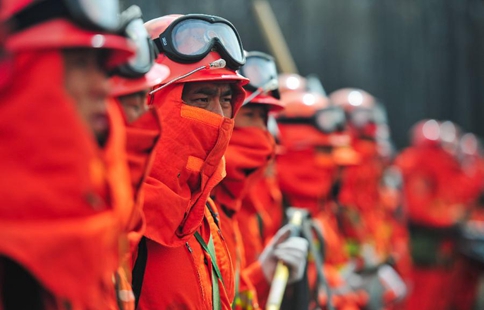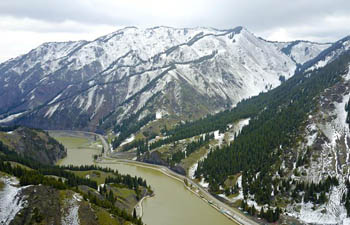by Peter Barker
LONDON, May 6 (Xinhua) -- The local election results in much of the UK point to the death of one of the major political parties and a crisis for another, experts said on Saturday.
The results of the local municipal elections come just five weeks before the general election on June 8, surprisingly called by prime minister Theresa May. These local elections were in many parts of the UK outside London.
Across England 2,370 seats were contested in 27 county councils, seven English unitary authorities and one metropolitan authority.
The Conservatives won 11 English councils and gained 313 councillors. Across the UK, including elections in Wales and Scotland, the Conservatives gained 558 seats, and were the only major party to gain seats.
The main opposition Labour party lost 320 seats nationally, including control of councils in core areas like the north east of England and in Scotland. In Scotland the Conservatives gained 164 seats and moved into the second spot, pushing Labour into third. Labour lost control of Scotland's largest city, Glasgow, for the first time in 40 years.
The new third party of UK politics, the UK Independence Party (UKIP) was almost entirely wiped out across the UK, losing 114 seats, almost all its seats.
"I think the Conservative Party has obliterated UKIP. It's difficult to see what the rationale of UKIP is; its purpose was to take Britain out of Europe, It has succeeded in doing that in the referendum," said Sir Ivor Crewe, master of University College, Oxford, and a veteran analyst of the UK electoral system.
"But the Conservative party is pledged to do what UKIP said it was in politics to do -- which was to take Britain out of the EU," Crewe told Xinhua in an exclusive interview.
The implications for UKIP performance at the June 8 general election are bad, and they are conversely good for the Conservatives.
"Given that the Conservatives is a party of government and UKIP is not, it makes sense for UKIP voters to switch to the Conservatives," he said.
UKIP won 22 percent of the vote the last time these local elections were contested, and one in eight of all votes cast at the last general election in 2015, and who those voters support in June could decide the election.
Professor Thom Brooks, Head of the Durham Law School and associate in the School of Government at Durham University, said that it was a "surprise that the UKIP vote had totally collapsed".
"UKIP completely imploded, it has had a lot of problems at the top. Nigel Farage stepping away. They are really struggling to find a reason to exist, they are often seen as a single issue party that issue to some degree is resolved," said Brooks.
Crewe predicted that with no unique purpose and with collapsed electoral support UKIP will "now only survive on the political fringes, and it will probably become a fringe anti-Muslim party like the English Defence League (EDL) and British National Party (BNP). I would be very surprised if any UKIP MPs were elected in June."
TROUBLE FOR LABOUR
The local elections results were a portend of disaster in the general election for the main opposition Labour party, according to Crewe.
Normally opposition parties after two general elections win back the support they lost in the previous election, said Crewe, they are ahead in the polls and do well in local elections and byelections.
"On this occasion the Labour Party did spectacularly badly. I don't think an opposition party has done as badly in elections of this kind for many decades," he said.
"It is a warning to the Labour party that they are likely to go down to a very serious defeat, the Conservatives are likely to win a very handsome majority.
"The best estimate on the basis of these results is that the Conservatives will find themselves with a majority in three figures and the Labour party will be down to somewhere between 150 and 200 seats, which will be their worst showing since 1931. They have really done very very badly."
The results were part of a profound and long-term realignment in UK politics that has seen class political identity overtaken by nationalism, said Crewe.
Brooks said that Labour were expected to do even worse than they did do, and said the result was not disastrous.
"Disaster is too strong. It's true there are some challenges for the party ahead. There has been a fracture with MPs, the party membership has been very supportive of leader Jeremy Corbyn, he has not had much support from MPs," he said.
"The country is still in a turbulent time post-Brexit, I think the real question is going to be how the general election plays. I think if you had something terrible at the general election then I think there is cause for alarm but not as yet."

















